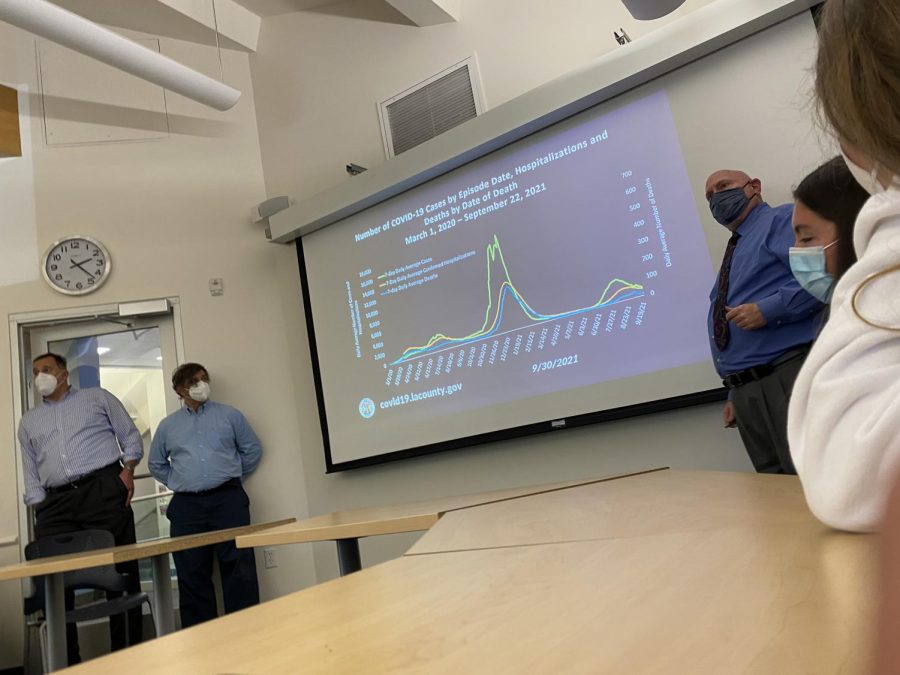LADPH official speaks to Directed Study class
Dr. Robert Gilchick explains COVID data as part of a slideshow presented to students, as Head of the History Department and Interdisciplinary Studies Department Larry Klein and Head of Communications and Strategic Initiatives Ari Engelberg ’89 look on.
October 6, 2021
Los Angeles County Department of Public Health (LADPH) Official Dr. Robert Gilchick spoke to students in the Directed Study: The Pandemic on Friday, Oct. 1. Directed Studies are specialized courses that meet twice a cycle and focus on advanced ideas, current issues, and other topics beyond the usual school curriculum.
Gilchick, who serves as the Maternal, Child and Adolescent Health Section Chief for the LADPH, has played a large role in the reopening of schools following their closure in March 2020 due to COVID-19. Head of the History Department and Interdisciplinary Studies Department Larry Klein hosted Gilchick, whose department designs COVID-19 safety guidelines and advisories for schools.
The Pandemic course is a one-time offering this year that examines the impact of the COVID-19 pandemic. Students learn about the pandemic’s effects on various aspects of society, including public policy, politics, science, economics, and social justice. A central feature of the course is a speaker series, in which students hear from experts in fields affected by the pandemic. In addition to Gilchick, speakers so far have included epidemiologists and front-line workers.
Head of Communications and Strategic Initiatives Ari Engelberg ’89, who has been leading the school’s COVID-19 strategy, has been working with Gilchick and suggested Klein invite Gilchick to speak.
Stephen Purdum ’22, who takes the course, said Gilchick provided valuable insight as one of the leaders in L.A.’s COVID-19 response. Purdum also said the visit served as a reminder that the pandemic has not disappeared and is still impacting L.A. and the country.
“It was really interesting to get the chance to hear from someone who was still involved in the daily fight against COVID-19,” Purdum said. “I feel like in a lot of ways most people have stopped thinking about the fact that the pandemic is still very much ongoing, so to get an on-the-ground perspective was super valuable.”
Gilchick spoke to students about how the LADPH has worked to mitigate the spread of the pandemic through public policy, and how at points, politics and misinformation have hindered their efforts. Gilchick also spoke about recent COVID-19 trends, and how increasing vaccinations led cases to decline.
Klein said that Gilchick’s visit helped students better understand the pandemic and the safety policies and guidelines that are guiding us through the pandemic.
“Dr. Gilchick’s presentation and interaction with students in the seminar deepened understanding and opened the door to some key questions to contemplate regarding Public Health policy and implementation,” Klein said. “The data he shared was very compelling and the space he created for discussion helped the section better understand what has been happening and why.”
Purdum said the speaker series has been a highlight of the course and he appreciates the speakers’ knowledge.
“I think in general the frequent visits from experts are one of the best parts of the class, as getting to hear from people who are personally involved just really elevates the class and the quality of the learning,” Purdum said.































